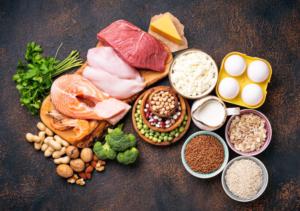Drop 12 Kgs (or More) This Month Without Starving Yourself
Hey, that sounds unrealistic but I lost 37 kgs in 6 months, and yes it is absolutely true, and at the age of 55 and even literally sitting on my couch and watching TV.
Introduction: Losing weight can be a challenging process, and it’s important to approach it in a healthy and sustainable way. While there are many fad diets and quick-fix solutions out there, the truth is that they won’t tell you. I opted for a diet that consists of No carbs (0 carbs), high fat, and high protein. I was amazed to see the result from day one.
What is a no-carb diet?
A no-carb diet is an approach to eating that kills edible carbs however much as could be expected. Carbs are your body’s essential wellspring of energy. They’re tracked down in grains, beans, vegetables, natural products, vegetables, milk, yogurt, pasta, bread, and prepared merchandise.
Subsequently, somebody on a no-carb diet should stay away from the majority of these food varieties and on second thought eat food varieties that contain basically protein or fat, like meats, fish, eggs, cheddar, oils, and spread. There is no severe rubric for a no-carb diet. Certain individuals who follow it eat nuts and seeds, non-boring vegetables, and high-fat organic products like avocado and coconut.
Despite the fact that these food sources have some carbs, they’re high in fiber. In this manner, they have just a little number of edible or net carbs, which is determined by deducting how much fiber from the all out number of carbs .
high protein and high-fat diet can have several benefits. Here are some of the pros of a high-protein and high-fat diet:

1. Helps with weight loss: A high protein and high-fat diet can help with weight loss as it makes you feel fuller for longer, reduces hunger, and controls cravings.
2. Builds and maintains muscle mass: Protein is essential for repairing and rebuilding muscle tissue, and a diet that is high in protein can ensure that your body has enough of the building blocks it needs to support muscle growth.
3. Boosts metabolism: A high protein diet can boost metabolism and lead to an automatic reduction in calorie intake and cravings, which can help with weight loss.
4. Improves appetite regulation: Protein intake triggers an increase in levels of the hormone that causes a feeling of fullness and reduces levels of the hormone that increases the feeling of hunger, resulting in better appetite regulation and a lower risk of food cravings.
5. Lowers blood pressure and cholesterol: A high protein diet can lower blood pressure and reduce LDL (bad) cholesterol and triglycerides.
6. Helps prevent muscle loss: Good protein intake can help prevent muscle loss if you are on a low-calorie diet and trying to lose weight.
7. Increases satiety: Including protein in your meals and snacks can help you to feel full and satisfied, which may help with portion control.
It’s important to note that while a high protein and high-fat diet can have several benefits, it’s essential to approach it in a healthy and sustainable way. It’s important to listen to your body and make changes that feel good and sustainable for you.
This might lead to better blood sugar management.
Cutting carbs — especially refined carbs and sugar — can help glucose control, which might be particularly useful for individuals with diabetes (15Trusted Source).
A few examinations show that low-carb and keto eats less carbs are compelling in decreasing glucose levels.
A 6-month concentrate on in 49 corpulent grown-ups with type 2 diabetes found that the people who followed a high fat and high protein diet had fundamentally more noteworthy decreases in hemoglobin A1c — a proportion of normal glucose — than the individuals who didn’t eat a carb free diet .
Diminishing carb admission can forestall spikes in glucose and may in this way assist with forestalling diabetes confusions. However, it’s not important to totally reject carbs from your eating regimen. Diabetes can be controlled on higher-carb counts calories, as well, as a matter of fact.
Other possible benefits
Lower blood pressure. Some studies suggest that reducing your carb intake can help lower blood pressure.
Reduction of belly fat. Limited research indicates that very-low-carb diets are better than low-fat diets at decreasing belly fat, a type of fat associated with inflammation and certain diseases.
Lower risk of metabolic syndrome. Decreasing carb intake may help prevent some of the risk factors associated with metabolic syndrome, such as high blood pressure, elevated blood sugar, and belly fat.
Conclusion: A no-carb diet eliminates almost all carbs and encourages high intakes of fat and protein. It may boost weight loss, heart health, and blood sugar control. with a proper guidance by a trained dietician.
